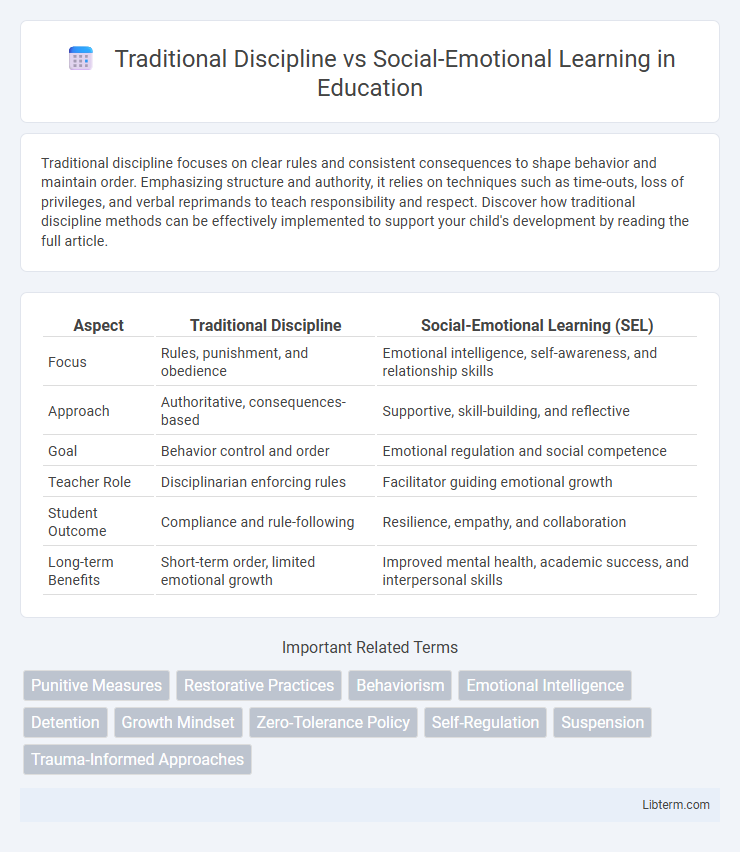Traditional discipline focuses on clear rules and consistent consequences to shape behavior and maintain order. Emphasizing structure and authority, it relies on techniques such as time-outs, loss of privileges, and verbal reprimands to teach responsibility and respect. Discover how traditional discipline methods can be effectively implemented to support your child's development by reading the full article.
Table of Comparison
| Aspect | Traditional Discipline | Social-Emotional Learning (SEL) |
|---|---|---|
| Focus | Rules, punishment, and obedience | Emotional intelligence, self-awareness, and relationship skills |
| Approach | Authoritative, consequences-based | Supportive, skill-building, and reflective |
| Goal | Behavior control and order | Emotional regulation and social competence |
| Teacher Role | Disciplinarian enforcing rules | Facilitator guiding emotional growth |
| Student Outcome | Compliance and rule-following | Resilience, empathy, and collaboration |
| Long-term Benefits | Short-term order, limited emotional growth | Improved mental health, academic success, and interpersonal skills |
Understanding Traditional Discipline Approaches
Traditional discipline approaches emphasize structured rules, clear consequences, and immediate behavioral correction to maintain order in educational settings. These methods often rely on punitive measures such as detention, suspension, or loss of privileges to deter negative behavior and encourage compliance. Rooted in behaviorist theories, traditional discipline prioritizes external control over student actions rather than addressing underlying emotional or social factors influencing conduct.
Core Principles of Social-Emotional Learning (SEL)
Social-Emotional Learning (SEL) centers on developing five core competencies: self-awareness, self-management, social awareness, relationship skills, and responsible decision-making. Unlike traditional discipline methods that emphasize compliance and punishment, SEL fosters emotional intelligence, empathy, and positive interpersonal interactions to create supportive learning environments. These principles enhance students' ability to manage emotions, establish healthy relationships, and make constructive choices essential for academic and life success.
Key Differences Between Traditional Discipline and SEL
Traditional discipline emphasizes external control through punishment and strict rules, focusing on correcting misbehavior to maintain order in educational settings. Social-Emotional Learning (SEL) prioritizes internal regulation by developing students' self-awareness, empathy, and emotional management to foster positive behavior and interpersonal skills. Key differences include traditional discipline's reactive approach versus SEL's proactive strategies that build emotional intelligence and long-term social competence.
Impact on Student Behavior and Academic Success
Traditional discipline methods, characterized by strict rules and punitive measures, often result in short-term compliance but can lead to increased student anxiety and disengagement, negatively impacting academic success. Social-emotional learning (SEL) programs foster emotional regulation, empathy, and positive relationships, which significantly improve student behavior by reducing aggression and absenteeism. Research shows that SEL integration enhances academic performance by creating a supportive learning environment that encourages motivation and resilience.
The Role of Teachers in Each Approach
Teachers in traditional discipline models enforce clear rules and consistent consequences to maintain classroom order and promote accountability. In social-emotional learning (SEL), educators act as facilitators, guiding students to develop self-awareness, emotional regulation, and interpersonal skills through supportive interactions. Both approaches require teacher engagement, but SEL emphasizes relationship-building and emotional intelligence to foster a positive learning environment.
Addressing Root Causes of Misbehavior
Traditional discipline often relies on punitive measures that focus on penalizing misbehavior rather than understanding its underlying causes. Social-emotional learning (SEL) addresses root causes by fostering self-awareness, emotional regulation, and interpersonal skills, promoting long-term behavioral change. Incorporating SEL into student discipline creates a supportive environment that reduces recurrence of misbehavior by targeting emotional and social factors.
Effectiveness in Building Positive School Climate
Traditional discipline methods, such as strict rules and punitive measures, often lead to compliance rather than genuine behavior change, limiting their effectiveness in fostering a positive school climate. Social-Emotional Learning (SEL) programs emphasize emotional regulation, empathy, and interpersonal skills, which research shows significantly improve student relationships and reduce behavioral issues. Schools that implement SEL report higher levels of student engagement, decreased bullying, and a more inclusive, supportive environment conducive to academic success.
Long-Term Outcomes: Discipline vs SEL
Traditional discipline often emphasizes immediate behavior control through punishment, which can lead to compliance but may not foster self-regulation or emotional growth. Social-emotional learning (SEL) promotes skills like empathy, self-awareness, and conflict resolution, resulting in improved academic achievement, mental health, and reduced behavioral problems over time. Research shows that SEL programs contribute to long-term success by equipping students with the tools to navigate social challenges and build positive relationships.
Challenges in Transitioning to SEL Methods
Transitioning from traditional discipline to social-emotional learning (SEL) methods presents challenges such as resistance from educators accustomed to punitive approaches and difficulty measuring SEL outcomes effectively. Schools face obstacles in reallocating resources for SEL training and integrating new curricula while maintaining academic standards. Ensuring consistent implementation across diverse classrooms requires ongoing support and adaptation to meet students' varied emotional and behavioral needs.
Integrating SEL With Traditional Discipline Strategies
Integrating Social-Emotional Learning (SEL) with traditional discipline strategies enhances student behavior management by fostering self-awareness, empathy, and problem-solving skills alongside clear behavioral expectations. Implementing restorative practices and conflict resolution within conventional disciplinary frameworks promotes accountability while supporting emotional growth and positive relationships. Research shows that combining SEL with traditional methods reduces recidivism in behavioral incidents and improves overall school climate.
Traditional Discipline Infographic

 libterm.com
libterm.com